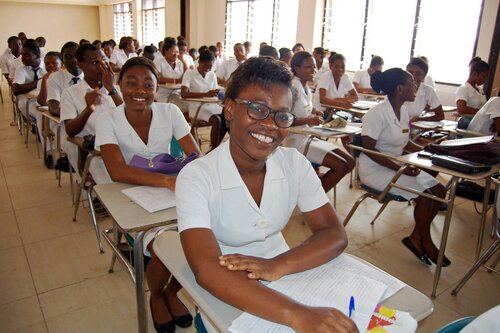UHC2030 is excited to welcome several new and distinguished...
20 April 2018
UHC2030 welcomes Ghana.

The Ghana Ministry of Health has recently committed to be a formal member of UHC2030 and sign the Global Compact.
We interviewed Dr Emmanuel Ankrah Odame, Director of Policy Planning, Monitoring and Evaluation of the Ministry of Health, to find out more about Ghana’s motivation to join the partnership and what they hope to get out of it.
Why did Ghana want to join UHC2030?
Ghana joining UHC2030 was something very dear to the country. As part of our constitution, universal health care means the right to healthcare for our citizens. This is mentioned every year as part of the State of the Nation address by our President. So in Ghana, universal health coverage is key to our efforts.
When we got to hear about UHC2030, we were interested especially in terms of harmonized coordination for health systems strengthening. Our President talks about a “Ghana beyond aid” and emphasizes domestic resource mobilization. UHC2030 talks about accountability, coordination, aligning efforts and avoiding duplication. It really fits in line with our national psyche. Signing the UHC2030 Global Compact brings our mission to life.
What do you hope to get out of being a member of UHC2030?
For us in Ghana, there are three important aspects of Universal Health Coverage: financial protection, quality of services and access to services. This is our tripod. In terms of financial protection, Ghana has had a National Health Insurance Scheme for about 12 years, and one third of the population is covered. We are the leading country in Africa in terms of national health insurance.
For the quality arm, we have a national quality strategy which is providing a coordinated approach to ensuring quality in all aspects of our health care, and for the physical access arm we have our Community Based Health and Planning Services (CHPS) for our community care, Health Centres for our sub district care, and our district hospitals which serves as the pinnacle of our Primary Health Care system.
We participate in the UHC2030 health systems assessment technical working group, the sustainability, transition from external financing and health systems strengthening technical working group, and the public financial management technical working group. The Ministry of Finance is very keen on PFM in order to promote stronger accountability in the country and we now have a Public Financial Management pact. This kind of engagement is very useful for us at country level. By being part of UHC2030 we get the opportunity to share our experiences and also learn from other countries.
What do you hope to contribute?
For us, we have a lot of experience with National Health Insurance, Primary Health Care Services, National Quality Strategy and delivering quality healthcare at all levels of the healthcare system. We are currently harmonizing our plans and budgets so we have one plan and one budget and we are encouraging donor efforts to be synergized. In this area, we have experiences we can share with other countries.
What other steps is Ghana taking towards achieving UHC?
The whole Ministry of Health is really keen to drive the agenda of Universal Health Coverage. We ensure that health needs are met at the lowest level of our healthcare system, at community level, through the Community-based Health Planning and Services (CHPS) Programme. We have community health officers, and they visit homes and pick up minor conditions, issue medication and immunization and can recognize symptoms and make referrals to higher-level health facilities.
We are also increasing accountability in the management of our health budget ensuring that our health managers can delivery the health services. We have set up a Health Facility Regulatory Agency to ensure quality standards are maintained in all our public and private health facilities, pharmacy shops etc.
What does UHC2030 bring in terms of added value?
For us in Ghana, the added value of UHC2030 is really about coordination, and synergizing the efforts of donors. This will bring efficiency gains, through donor alignment and harmonization.
For our efforts on health systems strengthening, we are trying to improve harmonization and alignment. Ghana is developing a transition plan and aim to get the major donors on board. This will help augment the harmonization to drive the transition phase, and enable us to increase reliance on domestic resources.
The possibilities of peer-to-peer learning among the partnership and collaboration are really about making progress towards UHC real.
The key point is that the world should be looking at how we make UHC happen in real time. We need to develop advanced monitoring systems, we need citizen involvement and citizen-led monitoring systems. We need to monitor health service delivery systems and ensure that mechanisms for delivery are efficient to make sure that health services are available in the right place at the right time.
We believe engaging with UHC2030 will help to make Sustainable Development Goal (SDG) Target 17.6 real.
Note: SDG 17.6 is Enhance North-South, South-South and triangular regional and international cooperation on and access to science, technology and innovation and enhance knowledge sharing on mutually agreed terms, including through improved coordination among existing mechanisms, in particular at the United Nations level, and through a global technology facilitation mechanism.Photo: © 2014 Gracey Vaughn for CapacityPlus and IntraHealth International, Courtesy of Photoshare
